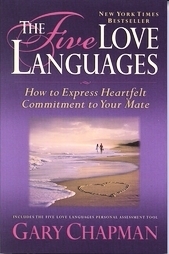Take a photo of a barcode or cover
1.84k reviews for:
The Five Love Languages: How to Express Heartfelt Commitment to Your Mate
Gary Chapman
1.84k reviews for:
The Five Love Languages: How to Express Heartfelt Commitment to Your Mate
Gary Chapman
If you can get past the fact that this book is written from a very specific viewpoint, it's a really great read.
It's so important to know how your partner receives love emotionally. This book is useful to anyone who wants to get better at loving their partner long term.
It's so important to know how your partner receives love emotionally. This book is useful to anyone who wants to get better at loving their partner long term.
challenging
hopeful
informative
inspiring
reflective
sad
fast-paced
This was an interesting read. I have been exposed to the concept of "love languages" through cultural osmosis living in the US and the UK, and found the idea potentially useful but also reserved a healthy skepticism for pop psychology. I did not know what to expect and was pleasantly surprised.
The core concept is this: each of of us has a need for love with some capacity (which he calls the 'love tank', by analogy to a gas tank in a car I guess) and has preferred ways to receive expressions of love. If you are trying to demonstrate your love for a partner, it's helpful to know what expressions of love resonate with them most strongly so you can fill up their love tank.
Whether or not you want to keep to the 5 languages Chapman highlights and really believe in them as their own Things, the idea that you and your partner might have different preferences and defaults is helpful.
The author is very vocally Christian, revealing at the end of the book that he found renewed faith when facing struggles in his own marriage, and he draws on biblical excerpts regularly for examples of love. As a Christian myself, I appreciate the illustrative value of Christ's love for the world, of self-sacrificial love, and of trying to love even your own enemies. What I do not appreciate is CW: bad advice in a seemingly abusive situationwhen this is used to advise a woman to express love she does not feel for a neglectful husband in order to fill *his* love tank by having sex with him, in the hope that helping him feel loved will lead to him expressing love for her again as well and thereby save their marriage . In this particular example, only one member of the married couple being discussed *wants* to save the marriage, so his advice is focused on that member of the marriage and what she can do about it. He does realise when giving this advice that it will be difficult and should not be undertaken lightly, but it still doesn't feel like the kind of clear case you'd want to use in a popular book to illustrate how speaking your partner's love language can be good for a relationship!
There are other problems along these lines, where it is clear that "the sanctity of marriage" is more important to the author than individual's well-being, or that he truly believes that his view of the world (a conservative Christian view of marriage and gender roles from the late 20th century in the US) would give people the most happiness. A lot of the examples are unnecessarily gendered and I'd like to read a version of this book which would serve more people, even if it keeps the biblical excerpts, by dropping the gender stereotypes, sexism, and obsession with marriage as the one-true-form-of-love worth pursuing and preserving.
The core concept is this: each of of us has a need for love with some capacity (which he calls the 'love tank', by analogy to a gas tank in a car I guess) and has preferred ways to receive expressions of love. If you are trying to demonstrate your love for a partner, it's helpful to know what expressions of love resonate with them most strongly so you can fill up their love tank.
Whether or not you want to keep to the 5 languages Chapman highlights and really believe in them as their own Things, the idea that you and your partner might have different preferences and defaults is helpful.
The author is very vocally Christian, revealing at the end of the book that he found renewed faith when facing struggles in his own marriage, and he draws on biblical excerpts regularly for examples of love. As a Christian myself, I appreciate the illustrative value of Christ's love for the world, of self-sacrificial love, and of trying to love even your own enemies. What I do not appreciate is CW: bad advice in a seemingly abusive situation
There are other problems along these lines, where it is clear that "the sanctity of marriage" is more important to the author than individual's well-being, or that he truly believes that his view of the world (a conservative Christian view of marriage and gender roles from the late 20th century in the US) would give people the most happiness. A lot of the examples are unnecessarily gendered and I'd like to read a version of this book which would serve more people, even if it keeps the biblical excerpts, by dropping the gender stereotypes, sexism, and obsession with marriage as the one-true-form-of-love worth pursuing and preserving.
Moderate: Domestic abuse, Infidelity, Toxic relationship
Minor: Ableism
inspiring
reflective
slow-paced
Supposed to be reflective and it did just that. Good to go through even if you already know because it doesn't read like the typical "self-help" read.
emotional
reflective
slow-paced
There’s a lot of issues here. Like he just doesn’t like chores so he makes his wife do it and calls it her love language? Also, gift giving is an act of service, but I suppose 4 love languages just doesn’t have the same effect. The quiz in the back is a good talking point I suppose. This may have been better as a Cosmopolitan article, but for some reason I doubt the author knows what that is.
Fairly dated, focusing only on married couples. But I love the concept and even though I knew a lot anout these love languages already I'm glad to have read the original!
Could any couple benefit from this advice? Sure, but only because of how basic it is. If you are a traditional couple who didn't talk about sex, finances, division of labor, or how to respectfully argue with your partner before you got married, this is for you.
I found this book rather unsettling and I couldn't put my finger on why until I read its sequel about marriage. This book is extremely dated when it comes to gender roles. All the wives mentioned in this book are housewives whose main complaint is their husband doesn't help them around the house. (Their love language is never Physical Touch because, as we learn in the book, women are special creatures who absolutely must have an emotional connection before they deign to enter their husbands' bedchambers). Men are always upset at how sensitive their wives are (almost all the men's love language is Physical Touch because they're big strong macho men who can't wait to give their housewives all their D after a long day at the office).
This book may not have been written expressly for traditional religious couples, but it's clear that most of the author's clients fall along these lines. As a 21st-century woman who likes to maintain control of her finances, property, and vagina, this was slightly helpful to me, but I won't be using it as a strong reference in my relationships.
I found this book rather unsettling and I couldn't put my finger on why until I read its sequel about marriage. This book is extremely dated when it comes to gender roles. All the wives mentioned in this book are housewives whose main complaint is their husband doesn't help them around the house. (Their love language is never Physical Touch because, as we learn in the book, women are special creatures who absolutely must have an emotional connection before they deign to enter their husbands' bedchambers). Men are always upset at how sensitive their wives are (almost all the men's love language is Physical Touch because they're big strong macho men who can't wait to give their housewives all their D after a long day at the office).
This book may not have been written expressly for traditional religious couples, but it's clear that most of the author's clients fall along these lines. As a 21st-century woman who likes to maintain control of her finances, property, and vagina, this was slightly helpful to me, but I won't be using it as a strong reference in my relationships.
Very very insightful and puts many things into perspective. Would highly recommend it to anyone who is married, in a serious relationship, or intends to be in one in the future. The five love languages can also be applied to non-romantic relationships but this one focuses more on marriage, but if im not mistaken the author has a book about it focusing on children too.
Hopeful point of view. Full disclosure: I tuned out at the Jesus stuff.






